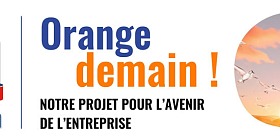ENO 3 : on réinternalise (enfin !) la supervision de nos réseaux mobiles européens
Rédigé par Hélène MARCY le . Publié dans Comité Groupe Europe+Monde.
[French version here/English version below]
Le projet ENO 3 était à l’ordre du jour du Comité de Groupe Européen d'Orange des 28,29 et 30 juin 2022 à Bruxelles. La présentation était assurée par 3 représentants de la division Innovation : Laurent LEBOUCHER, SVP Orange Innovation Networks, Friedel KEHNE, Director Network Operations, Stefan IONESCU, NSSO Director, ainsi que Witold KONOPKA, VP IT&N Transformation Europe, et Jean Michel POULALION, Vice-Président Europe en charge des Ressources Humaines.
ENO : un projet au long cours démarré en 2013 et inscrit dans une démarche globale d’optimisation de la supervision de nos réseaux mobiles cœur en Europe
ENO (European Network Optimization ou European Network Outsourcing selon les époques et les documents) est désormais un projet bien connu du Comité de Groupe européen. Il s’agit d’optimiser la supervision et la maintenance de nos réseaux mobiles cœur dans 7 pays d’Europe : Belgique, Espagne, Luxembourg, Moldavie, Pologne, Roumanie, Slovaquie.
Vous pouvez en retrouver l’historique détaillé dans nos comptes-rendus des CGE où le sujet a été abordé.
À partir d’une réflexion initiée en 2013, le projet ENO a été articulé avec la mise en place d’un GNOCe (Global Network Operation Center Europe, ou centre global de gestion opérationnelle du réseau pour l’Europe), installé en Pologne et en Roumanie, actuellement placé dans la Direction NSSO (Network and Shared Services Operations), comme le SSPO (Shared Service Platform Operations) au sein d’Orange International Networks Infrastructures & Services (OINIS, ex IBNF). Vous suivez toujours ? Résumons-nous : à partir de 2014, la gestion opérationnelle de nos réseaux mobiles pour l’Europe, initialement réalisée par des équipes locales dans chacun des pays, a été rassemblée dans un GNOC européen, dont les équipes sont réparties entre la Pologne et la Roumanie. Il s’agissait de mutualiser l’ensemble des opérations, avec un objectif assumé d’économies d’échelles, qui à l’époque s’est traduit par la suppression de 150 à 200 postes (licenciements secs) dans les pays cédant leur activité de gestion des réseaux au GNOCe, tandis qu’aucune embauche n’était réalisée dans les pays prenants. Ce qui explique les avis négatifs rendus par le Comité de Groupe européen en 2014.
Vous pouvez retrouver tous nos articles sur les projets de GNOC, en Europe et en Afrique, via le moteur de recherche du site.
Le projet ENO 1, déployé entre 2014 et 2018, organisait la sous-traitance de la supervision et de la maintenance de nos réseaux mobiles européens à un prestataire externe, en lui transférant près de 300 salariés d’Orange en Europe, issus des différentes filiales locales qui assuraient directement ces activités pour leur territoire national. Le marché a été confié à Ericsson. Selon la Direction, c’était « l’équation magique », qui permettait tout à la fois de faire des économies et d’améliorer la qualité de service, le tout sans dégrader ni le nombre d’emplois, ni les salaires, ni les conditions de travail des collègues transférés vers le prestataire. Un conte pour enfants, dont les représentants des personnels n’ont pas été dupes.
Lors du Comité de Groupe européen de juin 2022, la Direction a cependant admis que les économies avaient été moins importantes qu’initialement envisagées, même si le document qui nous a été communiqué fait état d’un plein succès. Notons également qu’en dépit des promesses qui nous avaient été faites, nous n’avons jamais eu aucun suivi global des personnels transférés : combien l’ont finalement été ? avec quelles garanties ? ont-ils été satisfaits des conditions qui leur ont été faites chez Ericsson et sont-ils restés dans cette entreprise ? En dépit de nos demandes, et alors que la défense des emplois et des conditions faites aux salariés sont l’une des missions prioritaires du Comité de Groupe européen, nous ne le savons pas…
Pour ENO 2, il s’agissait de définir si Orange poursuivait le contrat avec Ericsson, redécoupait les missions (pilotage global par Ericsson et sous-traitance locale de la maintenance sur site dans les différents pays), voire réinternalisait les opérations, via la mise en œuvre de solutions d’automatisation, à l’époque en cours de développement chez Orange. Ces dernières n’étant pas jugées assez matures, en 2019, les contrats ont finalement été reconduits avec Ericsson comme prestataire unique, à l’identique de ENO 1 donc. Ces contrats expirent entre 2022 et 2023, et il faut donc se reposer la question : c’est le projet ENO 3.
ENO 3 donne finalement raison à un certain nombre d’objections formulées par les représentants du personnel sur les projets ENO 1 et 2
Le bilan d’ENO 2 laisse apparaître qu’il n’est plus forcément pertinent de sous-traiter ces activités. Les gains économiques s’érodent, tandis que nous perdons une partie de l’information utile. L’automatisation (utilisant l’IA) est désormais mature, tant chez Ericsson que chez Orange, et visiblement le prestataire ne nous en rend pas toutes les gains économiques qu’elle permet de réaliser. Le pilotage des réseaux permet également de récupérer des données exploitables pour améliorer nos réseaux, nos services et nos offres, ainsi que notre connaissance des usages de nos clients. Ces informations deviennent cruciales, notamment lorsqu’il s’agit de déployer de la 5G pour les entreprises, mais aussi pour gérer efficacement notre qualité de service et notre différenciation face à nos concurrents.
Réintégrer l’activité diminue notre dépendance à la sous-traitance, ce qui, enfin, devient une préoccupation de la Direction. Cela permet aussi de renforcer les compétences de notre GNOCe, et d’étendre progressivement ses missions vers de nouveaux segments de réseaux (RAN – Radio Access Network, transport, IP). Plus il développe ses activités, plus notre GNOCe augmente simultanément ses compétences et son efficacité économique.
Avec ENO 3, il s’agit donc de reprendre en direct les activités précédemment réalisées par Ericsson. Les équipes seront localisées en Roumanie et en Pologne, au sein de l'entité NSSO d'Orange Innovation Networks, qui a déjà démontré sa capacité à reprendre efficacement (en termes de qualité des prestations et d’économies réalisées) des activités précédemment sous-traitées.
La réintégration de ces activités engendrera :
- Des évolutions de postes et des promotions dans les équipes NSSO pour quelques dizaines de personnes appartenant déjà aux équipes
- Des embauches, avec potentiellement, en Roumanie uniquement, le retour chez Orange de collaborateurs précédemment partis chez Ericsson avec les contrats ENO 1 et consacrant la quasi-totalité de leur temps aux activités d’Orange.
Au total, les effectifs de NSSO pourraient doubler entre 2022 et 2023. Quant à la montée en compétences des équipes, elle sera accompagnée par Ericsson, tandis qu’une partie de la R&D en Data & IA d’Orange Innovation est injectée dans NSSO, dans des conditions jugées très satisfaisantes par les pays qui ont déjà engagé la démarche.
Le projet doit être finalisé d’ici la fin de l’année 2022, notamment via la signature des contrats entre le NSSO et nos filiales pays, pour une mise en œuvre opérationnelle échelonnée d’ici fin 2023 selon les pays.
Le Comité de Groupe européen demande une information-consultation
La Direction d’Orange nous a présenté le dossier sous forme de simple information, mais les représentants du personnels militent fortement pour que le dossier soit passé en information-consultation : il s’agit bien d’une transformation, et si le Comité est favorable au principe de cette ré-internalisation, nous voulons disposer du maximum d’informations sur le projet, du droit d’émettre un avis motivé (qui a entre autres la vertu de laisser une trace écrite), et d’un suivi dans la durée.
L’analyse juridique est en cours. À suivre donc.
[English version]
ENO 3: we are reinternalizing (finally!) the supervision of our European mobile networks
The ENO 3 project was on the agenda of the Orange European Works Council on June 28, 29 and 30, 2022 in Brussels. The presentation was provided by 3 representatives of the Innovation division: Laurent LEBOUCHER, SVP Orange Innovation Networks, Friedel KEHNE, Director Network Operations, Stefan IONESCU, NSSO Director, as well as Witold KONOPKA, VP IT&N Transformation Europe, and Jean Michel POULALION, Vice-President Europe in charge of Human Resources.
ENO: a long-term project started in 2013 and part of a global approach to optimize the supervision of our core mobile networks in Europe
ENO (European Network Optimization or European Network Outsourcing depending on the era and the documents) is now a well-known project of the European Works Council. This involves optimizing the supervision and maintenance of our core mobile networks in 7 European countries: Belgium, Spain, Luxembourg, Moldova, Poland, Romania, Slovakia.
You can find the detailed history in our reports of the EWCs where the subject was discussed.
Based on a reflection initiated in 2013, the ENO project was articulated with the establishment of a GNOCe (Global Network Operation Center Europe), located in Poland and in Romania, now placed in the NSSO (Network and Shared Services Operations) Department, like the SSPO (Shared Service Platform Operations) within Orange International Networks Infrastructures & Services (OINIS, ex IBNF). Are you still following? To summarize: from 2014, the operational management of our mobile networks for Europe, initially carried out by local teams in each of the countries, was brought together in a European GNOC, whose teams are divided between Poland and Romania. It was a question of pooling all the operations, with an assumed objective of economies of scale, which at the time resulted in the elimination of 150 to 200 jobs (dismissals) in the countries ceding their activity network management at the GNOCe, while no hiring was made in the participating countries. This explains the negative opinions issued by the European Works Council in 2014.
You can find all our articles on GNOC projects, in Europe and Africa, via the site's search engine.
The ENO 1 project, deployed between 2014 and 2018, organized the outsourcing of the supervision and maintenance of our European mobile networks to an external service provider, by transferring nearly 300 Orange employees in Europe, from the various subsidiaries which directly provided these activities for their national territory. The contract was awarded to Ericsson. According to management, this was the "magic equation", which made it possible both to save money and to improve the quality of service, all without degrading the number of jobs, salaries or working conditions of colleagues transferred to the service provider. A tale for children, whose staff representatives were not fooled.
During the European Works Council in June 2022, however, Management admitted that the savings had been less significant than initially envisaged, even if the document that was sent to us reports complete success. It should also be noted that despite the promises made to us, we never had any overall follow-up of the personnel transferred: how many were transferred in the end? with what guarantees? were they satisfied with the conditions they were given at Ericsson and did they stay in this company? Despite our requests, and while the defense of jobs and conditions for employees are one of the priority missions of the European Works Council, we do not know...
For ENO 2, it was a question of defining whether Orange was continuing the contract with Ericsson, redefining the missions (global management by Ericsson and local subcontracting of on-site maintenance in the various countries), or even reinternalizing the operations, via the implementation of automation solutions, at the time under development at Orange. The latter not being considered mature enough, in 2019, the contracts were finally renewed with Ericsson as the sole provider, identical to ENO 1 therefore. These contracts expire between 2022 and 2023, and we must therefore ask ourselves the question: it is the ENO 3 project.
ENO 3 finally gives reason to a certain number of objections formulated by the staff representatives on the ENO 1 and 2 projects
The results of ENO 2 show that it is no longer necessarily appropriate to outsource these activities. Economic gains erode, while we lose some useful information. Automation (using AI) is now mature, both at Ericsson and at Orange, and obviously the service provider does not give us all the economic gains it allows to achieve. Network management also makes it possible to recover usable data to improve our networks, our services and our offers, as well as our knowledge of the uses of our customers. This information becomes crucial, especially when it comes to deploying 5G for businesses, but also to effectively manage our quality of service and our differentiation from our competitors.
Reintegrating the activity reduces our dependence on subcontracting, which, finally, becomes a concern of the Management. This also makes it possible to strengthen the skills of our GNOCe, and to gradually extend its missions to new network segments (RAN – Radio Access Network, transport, IP). The more it develops its activities, the more our GNOCe simultaneously increases its skills and its economic efficiency.
With ENO 3, it is therefore a question of resuming directly the activities previously carried out by Ericsson. The teams will be located in Romania and Poland, within the NSSO entity of Orange Innovation Networks, which has already demonstrated its ability to effectively take over (in terms of quality of services and savings made) activities previously under processed.
The reintegration of these activities will generate:
- Changes in positions and promotions in the NSSO teams for a few dozen people already belonging to the teams
- Hiring, with potentially, in Romania only, the return to Orange of employees who previously left for Ericsson with ENO 1 contracts and devoting almost all of their time to Orange activities.
In total, the workforce of NSSO could double between 2022 and 2023. The increase in skills of the teams will be supported by Ericsson, while part of the R&D in Data & IA of Orange Innovation is injected into NSSO, under conditions deemed very satisfactory by the countries that have already initiated the process.
The project must be finalized by the end of 2022, in particular via the signing of contracts between the NSSO and our country subsidiaries, for staggered operational implementation by the end of 2023 depending on the country.
The European Works Council requests an information-consultation
Orange management presented the project as a simple “information”, but the staff representatives are strongly campaigning for an “information-consultation”: it is indeed a transformation, and if the Committee is in favor the principle of this re-internalization, we want to have the maximum of information on the project, the right to issue a reasoned opinion (which has, among other things, the virtue of leaving a written record), and a long-term follow-up .
The legal analysis is in progress. To be continued then.
Emploi & Métiers Europe et International Comité Groupe Europe










